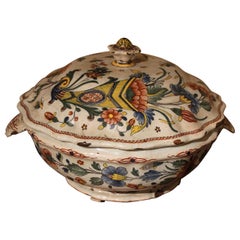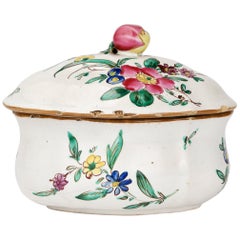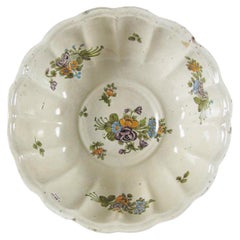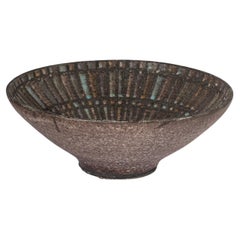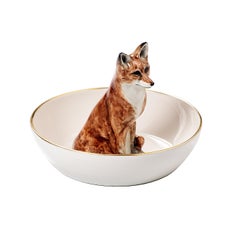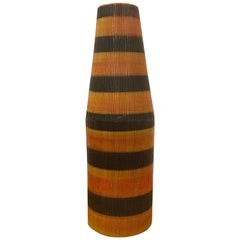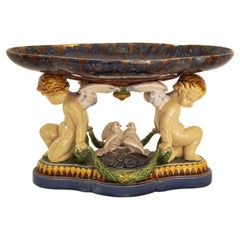Maiolica Decorative Bowls
to
4
3
1
1
1
3
1
149
3,671
3,117
2,662
1,467
4
4
3
1
Height
to
Width
to
4
4
4
1
1
1
Material: Maiolica
Antique French Faience Lidded Bowl Tureen Hand Painted with Flowers and Insects
By Rouen
Located in Firenze, IT
A French 18th century large polychrome Faience lidded soup toureen or entree dish with scallop-shaped edges attributable to Rouen manufacture.
This lovely...
Category
18th Century French Rococo Antique Maiolica Decorative Bowls
Materials
Maiolica, Porcelain, Pottery, Faience
Italian Maiolica Ancient Sugar Bowl, Lodi, 1770-1780
Located in Milano, IT
Maiolica sugar bowl
Antonio Ferretti Manufacture
Lodi, Circa 1770-1780
Maiolica polychrome decorated “a piccolo fuoco” (third fire).
It measures 3.54 x 4.52 x 3.54 in (9 x 11,5 x 9 cm)
Weight: 0.394 lb (0.179 kg)
State of conservation: small and slight chips on the edges.
The small sugar bowl has a swollen and ribbed body resting on a flat base. The cap-shaped lid follows the rib of the container and is topped with a small knob in the shape of a two-colored fruit.
The sugar bowl is painted “a piccolo fuoco” (third fire) with the characteristic floral motif of bunches and isolated semis.
An example which closely corresponds to this one is kept at the Civic Museum in Lodi (G. Gregorietti, Maioliche di Lodi, Milano e Pavia, Catalogo della Mostra, Milano, 1964 n. 137).
This decorative style represented a strong point of the Lodi factory, which established itself thanks to the vivid nature of the colors made possible by the introduction of a new technique perfected by Paul Hannong in Strasbourg and later introduced by Antonio Ferretti to Italy. The production process, called “piccolo fuoco” (third fire), allowed the use of a greater number of colors than in the past; in particular, the purple of Cassius, a red made from gold chloride, was introduced. Its use allowed for many more tones and shades, from pink to purple.
The Ferretti family started their maiolica manufacturing business in Lodi in 1725.
The forefather Simpliciano started the business by purchasing an ancient furnace in 1725 and, indeed, we have evidence of the full activity of the furnaces starting from April of the same year (Novasconi-Ferrari-Corvi, 1964, p. 26 n. 4). Simpliciano started a production of excellence also thanks to the ownership of clay quarries in Stradella, not far from Pavia. The production was so successful that in 1726 a decree of the Turin Chamber came to prohibit the importation of foreign ceramics, especially from Lodi, to protect internal production (G. Lise, La ceramica a Lodi, Lodi 1981, p. 59).
In its initial stages, the manufacture produced maolicas painted with the “a gran fuoco” (double fire) technique, often in turquoise monochrome, with ornamentation derived from compositional modules in vogue in Rouen in France. This was also thanks to the collaboration of painters like Giorgio Giacinto Rossetti, who placed his name on the best specimens next to the initials of the factory.
In 1748 Simpliciano made his will (Gelmini, 1995, p. 30) appointing his son Giuseppe Antonio (known as Antonio) as universal heir. After 1750, when Simpliciano passed away, Antonio was directly involved in the maiolica factory, increasing its fortunes and achieving a reputation on a European level. Particularly important was the aforementioned introduction in 1760 of the innovative “a piccolo fuoco” (third fire) processing, which, expanding the ornamental repertoire with Saxon-inspired floral themes, was able to commercially compete with the German porcelains that had one of its most renowned offerings in the naturalistic Deutsche Blumen. Antonio Ferretti understood and promoted this technique and this decoration, proposing it in a fresher and more corrective version, less linked to botanical tables, both with or without contour lines, as well as in purple or green monochrome. After efforts to introduce more industrial production techniques to the sector succeeded, even the Ferretti manufacture, in the last decade of the eighteenth century, started heading towards decline despite its attempts to adapt production to neoclassical tastes.
In 1796 the Napoleonic battle for the conquest of the Lodi bridge over the Adda definitively compromised the furnaces. Production resumed, albeit in a rather stunted manner, until Antonio's death on 29 December 1810. (M. L. Gelmini, pp. 28-30, 38, 43 sgg., 130-136 (for Simpliciano); pp. 31 sgg., 45-47, 142-192 (for Antonio).
Bibliography
G. Gregorietti, Maioliche di Lodi Milano e Pavia Catalogo della Mostra, Milano, 1964 n. 137;
C. Baroni, Storia delle ceramiche nel Lodigiano, in Archivio storico per la città e i comuni del circondario e della diocesi di Lodi, XXXIV (1915), pp. 118, 124, 142; XXXV (1916), pp. 5-8;
C. Baroni, La maiolica antica di Lodi, in Archivio storico lombardo, LVIII (1931), pp. 453-455;
L. Ciboldi, La maiolica lodigiana, in Archivio storico lodigiano, LXXX (1953), pp. 25 sgg.;
S. Levy, Maioliche settecentesche lombarde e venete, Milano 1962, pp. 17 sgg.;
A. Novasconi - S. Ferrari - S. Corvi, La ceramica lodigiana, Lodi 1964, ad Indicem; Maioliche di Lodi, Milano e Pavia (catal.), Milano 1964, p. 17;
O. Ferrari - G. Scavizzi, Maioliche italiane del Seicento e del Settecento, Milano 1965, pp. 26 sgg.;
G. C. Sciolla, Lodi. Museo civico, Bologna 1977, pp. 69-85 passim; G. Lise, La ceramica a Lodi, Lodi 1981;
M. Vitali, in Storia dell'arte ceramica...
Category
1770s Italian Rococo Antique Maiolica Decorative Bowls
Materials
Maiolica
18th Century Italian Majolica Faience Centerpiece Large Lodi Circular Bowl
Located in Milano, MI
18th century Italian collectible antique painted majolica bowl, a large basin-shaped centerpiece, with vertical ribs, decorated with polychrome flowers. Small chips, felure and minor...
Category
Mid-18th Century Italian Rococo Antique Maiolica Decorative Bowls
Materials
Maiolica
Large bowl, Aldo Londi for Bitossi, 1950s
By Aldo Londi, Bitossi
Located in Firenze, IT
Beautiful, large bowl designed by Aldo Londi for Bitossi, for which he was art director, in the early 1950s. It is molded with refractory earth in shades of brown with a rather rare ...
Category
1950s Italian Mid-Century Modern Vintage Maiolica Decorative Bowls
Materials
Ceramic, Maiolica
Related Items
Porcelain Bowl with Fox Figure Sofina Boutique Kitzbuehel
Located in Kitzbühel, Tirol
Completely handmade porcelain bowl with a hands-free naturalistic painted fox in brown colors. The fox is sitting in the middle of the bowl for decorating nuts or sweets around the fox figure...
Category
2010s German Black Forest Maiolica Decorative Bowls
Materials
Porcelain
Aldo Londi for Bitossi Large Vase
By Aldo Londi, Bitossi
Located in St.Petersburg, FL
Stunning large vase designed by Aldo Londi for Bitossi, features a seta design in rare "Lobster" colors.
Measures: 16” tall
5” wide.
Category
1960s Italian Mid-Century Modern Vintage Maiolica Decorative Bowls
Materials
Ceramic
Travertine Bowl With Lid
Located in Eindhoven, NB
Stunning, aesthetic, timeless are words that can be used to describe this elegant and modern travertine bowl from Kiwano. Expertly crafted and finished by hand, our travertine vases ...
Category
2010s Dutch Modern Maiolica Decorative Bowls
Materials
Marble
Aldo Londi Bitossi Rimini Blu Ceramic Round Bowl, 1950s
By Bitossi, Aldo Londi
Located in Barcelona, ES
Rimini Blue Bitossi Aldo Londi Bowl, Glazed Ceramic
Italian midcentury Aldo Londi Bitossi Rimini blue glazed ceramic circular bowl. Italy, 1950-19...
Category
Mid-20th Century Italian Mid-Century Modern Maiolica Decorative Bowls
Materials
Ceramic, Pottery, Terracotta
Vintage Moser Gilt Glass Bowl with Green Cabochons
By Moser
Located in Philadelphia, PA
A fine vintage Bohemian art glass bowl.
With large green cabochons around its circumference and rich gilt decoration.
Attributed to Moser.
...
Category
20th Century Czech Maiolica Decorative Bowls
Materials
Glass
Large Lalique Crystal Bowl Centerpiece
By René Lalique
Located in Tarry Town, NY
Beautifully hand crafted Lalique centerpiece decorative bowl in a wide open "V" form shape. The bowl is embellished by engraved frosted doves and large scrolls design details. Maker'...
Category
1970s French Art Nouveau Vintage Maiolica Decorative Bowls
Materials
Crystal
Aldo Londi for Bitossi Rimini Blu Leaf Shaped Glazed Ceramic Bowl / Ashtray
By Bitossi, Aldo Londi
Located in Barcelona, ES
Unusual leaf design midcentury blue glazed (Rimini Blu) ceramic bowl / vide-poche / ashtray. Italy, 1950-1960s.
Designed by Aldo Londi and manufactured by Bitossi. Handcrafted in It...
Category
Mid-20th Century Italian Mid-Century Modern Maiolica Decorative Bowls
Materials
Pottery, Terracotta, Ceramic
$889
H 2.56 in W 7.68 in D 5.91 in
Large Midcentury French Mosaic Ceramic Bowl Gerbino Vallauris
By Atelier Gerbino
Located in Austin, TX
Large midcentury French Mosaic Ceramic Bowl Gerbino Vallauris.
Diameter / 12 inches.
Category
1950s French Mid-Century Modern Vintage Maiolica Decorative Bowls
Materials
Ceramic, Faience
$760 Sale Price
20% Off
H 3.7 in Dm 12 in
Guido Gambone Stoneware Bowl Donkey Mark Signature, Italy, 1950s
Located in Munich, DE
Huge ceramic bowl by Guido Gambone with brown and orange glaze.
Signed on the bottom with the donkey mark.
Guido Gambone (1909 – 1969) is one of ...
Category
1950s Italian Mid-Century Modern Vintage Maiolica Decorative Bowls
Materials
Stoneware
Large Late 18th-Early 19th Century French Pottery Dough Bowl
Located in Houston, TX
Large late 18th early 19th century rustic 24"+ French pancheon or dough bowl. This antique French dough bowl has a beautiful green glazed int...
Category
Late 18th Century French Rustic Antique Maiolica Decorative Bowls
Materials
Terracotta
$1,750 Sale Price
33% Off
H 9.13 in Dm 24.38 in
Large 18th C Blue and White Spanish Lebrillo Bowl
Located in Hastings, GB
A large Lebrillo bowl, made in Granada, Spain in the late 18th century. Hand decorated using blue paints, most likely formed using a variety of ground mi...
Category
1790s Spanish Spanish Colonial Antique Maiolica Decorative Bowls
Materials
Ceramic
Late 17th-Early 18th Century Italian Majolica Bowl
Located in Hudson, NY
This good sized bowl is a great example of the majolica wares produced in Italy throughout the 15th, 16th, 17, and 18th centuries. Humble and simple but highly decorative and enterta...
Category
Early 18th Century Italian Antique Maiolica Decorative Bowls
Materials
Majolica
Previously Available Items
Antique 19th Century Minton Majolica Centerpiece Tazza with Doves & Cherubs 1861
By Minton
Located in Portland, OR
A good antique Minton Majolica centerpiece/tazza, 1861.
The centerpiece with a flanged shaped shallow dish supported with a pair of winged cher...
Category
1860s English Victorian Antique Maiolica Decorative Bowls
Materials
Maiolica
H 6.5 in W 11 in D 7 in
Recently Viewed
View AllMore Ways To Browse
Tage Frid
Tree Trunk Bowl
Viking Plate
Vintage Clay Bowls
Vintage Food Container
Vintage Gondola Basket
Vintage Mexican Pottery Bowls
Vintage Strawberry Basket
Wood Dough Trough
Yellow Onyx Furniture
Alabaster Pedestal Bowl
Alberto Dona Gold Murano Glass Bowl
Anish Kapoor Sculpture
Antique India Brass Bowls
Antler Bowl
Bitossi Pedestal
Carved Jade Bowl
Celadon Large Bowl
